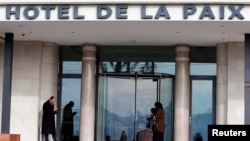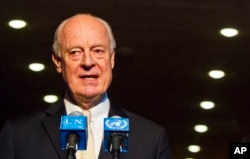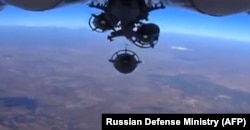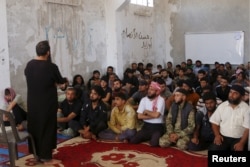A committee of key Syrian opposition groups is expected to decide Wednesday whether to participate in U.N.-brokered peace talks in Geneva.
U.N. Syria envoy Staffan de Mistura sent out invitations to the negotiations on Tuesday, but did not disclose who was on the list.
The High Negotiations Committee contends it should be the sole opposition delegation, and while members have signaled a positive leaning toward the talks, their final decision is due after more discussion Wednesday.
Several other opposition figures who are not a part of the committee have said they were also invited, including Haytham Manna, a prominent opposition figure who is co-chair of the political wing of a Kurdish-Arab alliance.
Manna on Wednesday criticized the exclusion of some Kurdish and Arab leaders and said he hoped organizers hear those concerns and form a "strong and representative delegation."
"I'll go with my friends or not," he said. "There is no compromise in this question."
Democratic Union Party (PYD) not invited
Syria's most powerful Kurdish party, the Democratic Union Party (PYD), said it had not been invited. Russia wants to include the Syrian Kurds at the talks, but Turkey remains adamantly opposed to their participation.
Turkey considers the PYD and its armed wing to be an offshoot of the banned Kurdistan Worker's party (PKK), which has waged a bloody, three-decade fight against the Turkish government for autonomy in mainly Kurdish southeastern Turkey.
But Russian Foreign Minister Sergei Lavrov warned Tuesday that the talks "cannot achieve the results we want, a definitive political resolution in Syria," if the Syrian Kurds are excluded from the talks.
More than 260,000 people have been killed in Syria since the civil war began with anti-government protests in March 2011.
At a news conference, the top Russian diplomat said Moscow has not asked Assad to step down and has not offered him political asylum.
Putin's response
Russian President Vladimir Putin had hinted in an interview earlier this month that taking in Assad would be no problem.
Lavrov said that Russia's four-month air campaign backing Assad has helped "turn the tide" in Syria, where the government has been battling rebels for nearly five years and, more recently, the Islamic State group as well.
Western nations have criticized Russia's military operation in Syria, saying it focuses on the rebels in an attempt to prop up Assad, and not on Islamic State, which a U.S.-led coalition has been targeting with an aerial bombardment.
The violence continued Tuesday with a double suicide bombing in the western city of Homs that state media said killed at least 22 people and wounded more than 100 others. Islamic State claimed responsibility for the attack.
Making gains
Russia appears to be hardening its position on Syria, as it backed government forces making gains against rebels before the peace talks start.
The Syrian Observatory for Human Rights reported that the Syrian Army, with the help of Russian airstrikes, seized control overnight of a strategic rebel-held town near the border with Jordan.
Syrian opposition groups had signaled they would not participate in talks unless the Russian and Syrian airstrikes were halted and sieges against towns were lifted.
Lavrov said Russia’s air support had drastically altered the situation in Syria and “helped narrow the area controlled by terrorists.”
He added, “Moreover, we also got a clear picture of who is fighting the terrorists and who is acting in the role of their accomplices, trying to use them in their own egotistic, one-sided goals.”
Russia began accusing Turkey of supporting terrorists in Syria after a Turkish warplane shot down a Russian bomber in November along the Turkish-Syrian border. Ankara denies the accusation.
Turkey is part of the U.S.-led coalition fighting Islamic State and other terrorist groups in the region.
Russia labels all the rebel groups fighting Assad as terrorists and is accused by Assad opponents of targeting rebels instead of Islamic State terrorists. Russia is accused of having killed hundreds of civilians in its air campaign, while Moscow claims no civilians have been killed.
Moscow-based political scientist Victor Mizin said the differences between the sides vying for control of Syria are stark.
"The rivalries and the divergences in approaches are quite visible. And, I think that ... it is quite evident that they would be also visible in the coming negotiations," Mizin said.
VOA’s Daniel Schearf in Moscow and Ken Bredemeier in Washington contributed to this story.

















